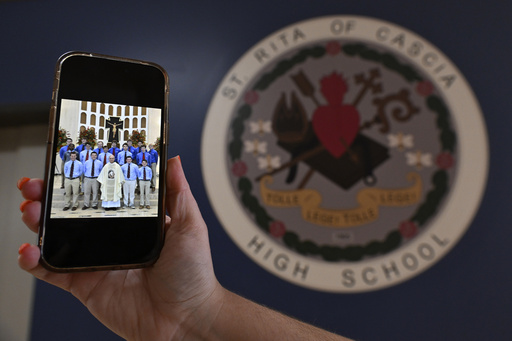CHICAGO — On Thursday, excitement electrified the air when white smoke rose from the Sistine Chapel, announcing the election of a new pope. At The Frances Xavier Warde School in Chicago, every student focused intently on TV screens to witness this historic moment unfold.
When it was revealed that the new pope was none other than Chicago’s own Cardinal Robert Prevost, the school erupted in joyful cheers. Children leapt from their chairs, waving their arms with enthusiasm. “Our students can hardly contain themselves,” said Mary Perrotti, the school’s director of advancement. “The idea that a Chicagoan is leading the Catholic Church thrills them beyond measure.”
Prevost, aged 69, adopted the name Leo XIV, succeeding Pope Francis, who passed away recently. As the first American to ascend to the papacy, Pope Leo XIV, hailing from Chicago and having carried out much of his ministry in Peru, is a cause for celebration among Catholic Chicagoans, who gathered in churches and celebrated in their homes.
“We now have a leader our young people can look up to — someone with justice and compassion deeply embedded in his work, and he’s from their hometown,” Perrotti expressed. “It’s a profound connection for them.”
Born in 1955 in Chicago’s Bronzeville neighborhood and subsequently raised in suburban Dolton, Prevost’s early life revolved around St. Mary of the Assumption, where he regularly attended Mass and completed his elementary education.
He pursued theological studies at the Catholic Theological Union of Chicago in Hyde Park and shared his knowledge by teaching at several local Catholic schools, including St. Rita High School. “We are immensely proud to see someone we hold in such high regard become the esteemed leader of the Catholic Church,” expressed Barbara Reid, a Dominican sister and president of the Catholic Theological Union.
Reflecting on Prevost’s deep-rooted ties to their hometown, John Doughney, a classmate from St. Mary’s grade school in 1969, reminisced about him as an affable, kind, and compassionate person. “Even in his pre-teens, it was obvious he was destined for a life of service,” Doughney said. “We couldn’t be prouder of his journey into the priesthood.”
Linda Eickmann, another Dolton native who shared an educational path with Prevost at St. Mary’s, expressed her joy upon learning about the new pope. “How amazing!” she exclaimed. “A pope from my hometown and school—it feels surreal.” Eickmann recalled his family’s vibrant presence within the St. Mary’s community, noting gatherings like sloppy joe sales for school fundraising and remembering all the Prevost sons serving as altar boys.
Thursday marked a momentous occasion for Chicago’s community, as noted by Raul Raymundo, co-founder of the community advocacy group The Resurrection Project. Raymundo hoped Pope Leo XIV would carry forward the legacy of social justice established by Pope Francis and similarly resonate with Chicago’s traditions of compassion and immigrant support. “There are tears of joy, wishes for progress, and motivation to elevate this moment and effect positive global change,” Raymundo expressed.
Following the announcement, Chicagoans converged in churches and expressed their enthusiasm through online memes celebrating Pope Leo XIV. At Holy Name Cathedral, sunlight streamed through stained glass as individuals gathered to pray. Laurel Legler, not a Catholic or Christian, felt compelled to be there, calling it a “profound moment.”
Zoë Poehlman, a recently relocated nurse from Kansas City, captured the mood, saying, “It felt exhilarating and I’m hopeful for citywide celebrations.” Father Gregory Sakowicz, the cathedral’s rector, humorously noted the coincidence of sun emerging with the announcement — suggesting it was “God’s way of remaining anonymous.”
A light-hearted repartee ensued when a journalist queried if Pope Leo XIV was a White Sox fan, to which it was humorously confirmed he supported the team. Social media burgeoned with memes celebrating Chicago’s distinct culture and pride in one of their own assuming the papacy. Topics like deep-dish and tavern-style pizzas, Malört, and competitive local sports emerged, highlighting the city’s vibrant spirit.
Google searches for “Da Pope” surged, and local vendors raced to design T-shirts emblazoned with the phrase in Bears colors. Viral videos amusingly juxtaposed classic Chicago Bulls music with footage from the pope’s appearance at the Vatican.
Online jesting touched on replacing traditional communion elements with local offerings like tavern-style pizza and Malört, while Portillo’s jokingly considered sending its iconic Italian beef to the Vatican.
Amidst the humor, many Chicagoans voiced hopeful expectations for Pope Leo XIV’s focus on social justice, tying back to the city’s historical ethos in the belief that his Chicagoan upbringing will continue to inspire his sense of compassion and justice. “For religiously-minded Chicagoans, having someone from their midst represent them globally sends a powerful message about our shared values,” Perrotti concluded.



